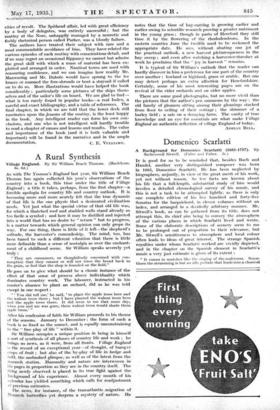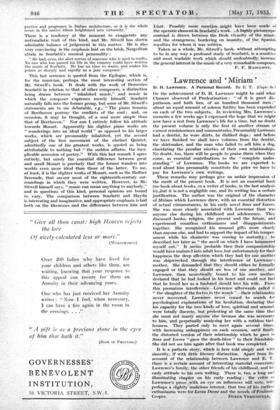Domenico Scarlatti
A Background for Domenico Scarlattl (1685-1757). By Sacheverell Sitwell. (Faber and Faber. 5s.) IT is good for us to be reminded that, besides Bach and Handel, another very distinguished composer was horn in 1685, Domenico Scarlatti. He has been neglected by biographers, unjustly, in view of the great merit of his work, yet not without reason. So few facts are known about his life that a full-length, substantial study of him would involve a detailed chronological survey of his music, and this is not a task to be attempted lightly, as there is only one complete edition of his five hundred and forty-five Sonatas for the harpsichord, in eleven volumes without an index, and arranged in a decidedly arbitrary manner. Mr. Sitwell's book, as can be gathered from its title, does not attempt this, its chief aim being to convey the atmosphere of the various places in which Scarlatti lived and wrote. Some of the elaborate descriptions of scenery seem to me to be prolonged out of proportion to their relevance, but Mr. Sitwell's sensitiveness to atmosphere and local colour often leads to ideas of great interest. The strange Spanish royalties under whom Scarlatti worked are vividly depicted, and in the chapter on the Spanish element in Scarlatti's music a very just estimate is given of its extent : " It comes in snatches like the singing of the muleteers. Some- times the strumming is but an idle prelude that loads into a classical portico and progresses in Italian architecture, or it is the whole scene in the native idiom heightened into virtuosity." • There is a tendency at the moment to exaggerate any nationalistic trait of this kind, and Mr. Sitwell has shown
admirable balance of judgement in this matter. He is also very convincing in-the emphasis laid on the brisk, Neapolitan strain in Scarlatti's musical personality : " He had, even, the, alert nerves of someone who is used to traffic. No one who has passed his life in the country could have written the music of Scarlatti. He has no time to waste, and makes his points as sharply and rapidly as a jazz composer."
This last sentence is quoted from the Epilogue, which is, for the musician, perhaps the most interesting section -of
Mr. Sitwell's book. It deals with the work of Domenico Scarlatti in relation to that of other composers, a distinction being drawn between " inhabited music," and music in which the composer expresses merely himself. Scarlatti
naturally falls into the former group, but some of Mr. Sitwell's statements are to me debatable, e.g., "The piano Sonatas of Beethoven portray the conflicts of the soul ; and, on
occasion, it may be thought, of a soul more simple than that of Beethoven." Nor can I entirely follow his attitude towards Mozart. Apparently his slighter piano works are " wanderings into an ideal world " as opposed to his larger works, which are presumably inhabited, yet the second subject of the first movement of the clarinet Quintet, admittedly one of his greatest works, is quoted as being attributable to nothing but " the sudden afflatus, the inex- plicable accession of poetry." With this last remark I agree entirely, but surely the essential difference between great and small Mozart is precisely that the former wanders into worlds even more ideal than those of the latter. To me,
at least, it is the slighter works of Mozart, such as the Haffner Serenade, that savour most of the eighteenth-century sur- roundings in which they were written. However, as Mr-.
Sitwell himself says, " music can mean anything to anybody," and in questions of this kind, personal opinions are bound to vary. The comparison between Scarlatti and Haydn is interesting and imaginative, and appropriate emphasis is laid both on the likenesses and the differences between him and
Liszt. Possibly more mention _might have been made of the operatic-element in Scarlatti's work. ,A highly-picturesque contrast is drawn between the fresh vivacity of the musk% and the strangeness, bordering on insanity, of the Spanish royalties for whom it was- written.
_Taken as a whole, Mr. Sitwell's hook, without attempting to be in any way a profound study of Scarlatti, is a sensitive and most readable work which should undoubtedly, increase the general interest in the music of a very remarkable composer.
P. F. RADCLIFFE.











































 Previous page
Previous page